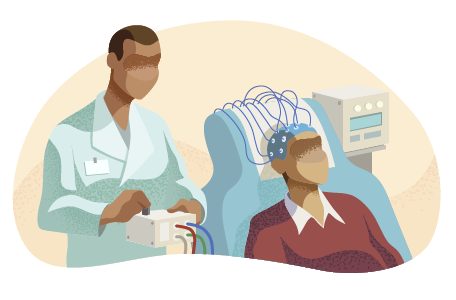

- #Eeg technician how to
- #Eeg technician full
Writes a technical report under supervision, which serves as a preliminary report to the patient’s physician.
Abstracts relevant information from patient’s clinical record and obtains additional information by questioning. Documents all abnormal clinical manifestations observed during the exam. Properly obtains standard recording, recognizes artifacts and takes appropriate steps to eliminate them. Selects predetermined electrode combinations as well as special combinations. Calibrates and adjusts the EEG apparatus in accordance with standard procedures. Emails the scheduled Neurologist to notify of all examinations requiring a reading on a daily basis, as well as following up on studies that were previously sent for readings, that are still unread. Applies suitable electrodes on pre-determined measured positions on the patient’s head, and checks their performance. Explains procedures and assures patient’s cooperation during exam. Performs standard electroencephalographic procedures for patients as ordered by physicians (in department, patient room, intensive care unit). Troubleshoots all technical issues with the assistance of the internal IT department, the vendor and the bio-medical department until the issues have been adequately resolved. Performs hyperventilation and photic stimulation studies as needed. #Eeg technician full
Adequately adjusts the acquisition video cameras so that the patient is in full view at all times and that the patient seizure notification is functional. Writes in the progress section of the patient’s chart after making daily rounds. Ensures that all review stations are functioning properly on a daily basis. Verifies the acquisition data is adequately displayed and functional at the nursing station. Assists in escorting the patient back to the nursing unit and ensures that the acquisition unit is placed on the network. Hooks up patients for the VEEG examination with use of Collodium or another suitable adhesive along with the appropriate head dressing in adequately for long term monitoring. Performs Video-Electroencephalographic procedures for patients as ordered by physicians (in department, patient room, intensive care unit, Pediatrics dept, Emergency room, and other nursing units as required). To protect the safety of our patients, staff, and the community at large effective AugNYU Langone Health requires COVID-19 vaccination of all faculty, staff, voluntary attending physicians, Howard Hughes Medical Institute employees, non-compensated faculty, students, clinical or academic observers, and volunteers, unless granted an approved exemption (in New York State, only medical exemptions shall be considered). It’s no wonder why the name NYU Langone Health has become synonymous with excellence. +to+check+for+abnormalities+in+the+brain..jpg)
Plus, our doctors and nurses are routinely voted as some of the best in the nation. Our growing outpatient network allows us to deliver our exceptional medical services directly to the communities we serve. Our world-class facilities service all five boroughs and treat a full range of medical conditions in both inpatient and outpatient settings. With over six inpatient locations, and additional facilities spread throughout, NYU Langone Health is New York City’s premier healthcare institution. We’re committed to providing an environment that encourages growth and innovation because NYU Langone Health is serious about improving patient outcomes across the board. From our award-winning Rusk Rehabilitation Center to our state-of-the-art Pharmacy and Respiratory services, our brilliant, world-class Allied Health Professionals have been pushing the envelope of patient-centered care. Meanwhile, many eeg technicians also have previous career experience in roles such as certified nursing assistant or medical assistant.NYU Langone Health’s Allied Health services span a gamut of disciplines. In fact, many eeg technician jobs require experience in a role such as sleep technician. You may find that experience in other jobs will help you become an eeg technician. Other degrees that we often see on eeg technician resumes include high school diploma degrees or diploma degrees. When we researched the most common majors for an eeg technician, we found that they most commonly earn bachelor's degree degrees or associate degree degrees.
#Eeg technician how to
Even though some eeg technicians have a college degree, it's possible to become one with only a high school degree or GED.Ĭhoosing the right major is always an important step when researching how to become an eeg technician. In terms of higher education levels, we found that 4.8% of eeg technicians have master's degrees. We've determined that 34.5% of eeg technicians have a bachelor's degree. If you're interested in becoming an eeg technician, one of the first things to consider is how much education you need.



+to+check+for+abnormalities+in+the+brain..jpg)


 0 kommentar(er)
0 kommentar(er)
